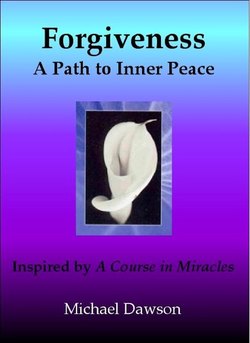Читать книгу Forgiveness: A Path to Inner Peace - Inspired by A Course in Miracles - Michael Dawson - Страница 7
Forgiveness of Ourselves or Others?
ОглавлениеWho needs to be forgiven? This is a fundamental question. Many of us believe we need to strive to forgive the wrongs that seem to have been done to us. We feel victimised by the seemingly unfair actions of others and believe our anger towards them is justified. But is it always the others who need to be forgiven, or could it maybe be ourselves? Do we have to remain victims or is there another way?
The personal tension created by holding grievances against another is unpleasant. We may feel we are in the right, but at great personal cost to our own peace of mind. To alleviate such tension we might choose to 'forgive’ the other person; although in our opinion they have committed a wrong, we decide to overlook it. We would, however, love to hear them apologise, proving their guilt and our innocence. But an apology may not be forthcoming; indeed the person with whom we hold our grievance may now have died.
We tell our friends we have forgiven our enemy; we are prepared to forget and get on with life. But have we really returned our mind to a state of peace, or is there lurking an ongoing disquiet about this episode? Do we carry on and forget the incident only to find that past pain is still there just waiting to be triggered by events similar to the one we have just ‘forgiven’? Has our forgiveness worked? Has the willingness to put all this behind us and to overlook the sins of the other actually resolved anything?
Our cultural and religious upbringing generally decrees what is right and what is wrong behaviour. If someone acts towards us with 'wrong' behaviour, we are usually taught that our anger is justified; the other person should apologise and change his or her behaviour. If they conform to our expectations, we are then open to ‘forgiving’ them, but not otherwise.
The quotation at the start of this chapter reminds us that we never get angry over a fact: it’s our interpretation of the fact that can give rise to anger. Forgiveness tells us we can always choose our reaction to any situation.
Consider the following story:
Imagine you are at a party with three friends. Let’s call them John, Peter, and Mary. The topic of conversation gets around to a recent news story about the rise in obesity in the United Kingdom population and its effect on the National Health Service. It was clear from the article that diseases related to obesity were costing the NHS millions of pounds each year. The writer of the article felt it was unfair how the sector of the population that was not obese had to carry the financial penalty for those who are. One of his suggestions was that the obese should pay a contribution towards their treatment if they suffered from an obesity-related illness.
John, who is somewhat overweight, feels this is an outrageous suggestion, clearly lacking in compassion for the plight of the obese. Peter, who keeps trim with regular workouts in the gym, thinks it an excellent suggestion; he is happy this issue has been raised in the national press, feeling it is high time something is done about it. This obvious clash of opinions soon provokes fierce discussion between the two men. Mary has stood by, quietly listening. Although being a bit overweight herself, she cannot muster any interest in this debate; her mind is more focused on the evening ahead.
In the above story, we can see how one event or stimulus – in this case the newspaper report – produced three entirely different responses. John was angry, Peter happy, and Mary indifferent. Each person chose his or her own response to the facts in the article.
No stimulus has any inherent power to create a certain response in all people. We ourselves always choose how we react in any given situation; there is nothing in this world that has the power to take our peace away. Yes, certain events can lead us to experience physical pain, but even in these events it is our personal choice whether to get upset about it or not.
I remember watching a dramatised documentary about a white fur trapper working within the Arctic Circle who became good friends with an Eskimo family. This Eskimo tribe had a particular custom, which was to share everything they possessed (including their wives) with close friends. One day the husband announced to the fur trapper that he would be very happy if he were to sleep with his wife. He added that it would also make his wife very happy; this was not a custom imposed upon the women, but something they happily agreed to. The fur trapper was shocked and declined their offer. His reaction upset the family deeply.
In one scene, the distressed wife asked the fur trapper why he had refused her: was it that she was ugly? Neither the husband nor the wife could understand why a close friend would not want to share their life. Contrast this response to what we might normally expect here in the West if a husband came home and found his wife in bed with his best friend! The typical response would be strong negative feelings such as anger, fear, outrage, and betrayal: an example of one stimulus causing opposite reactions. It follows that an event in itself cannot provoke an automatic response; it is always we who choose the response to any situation. This choice of response lies at the heart of forgiveness.
